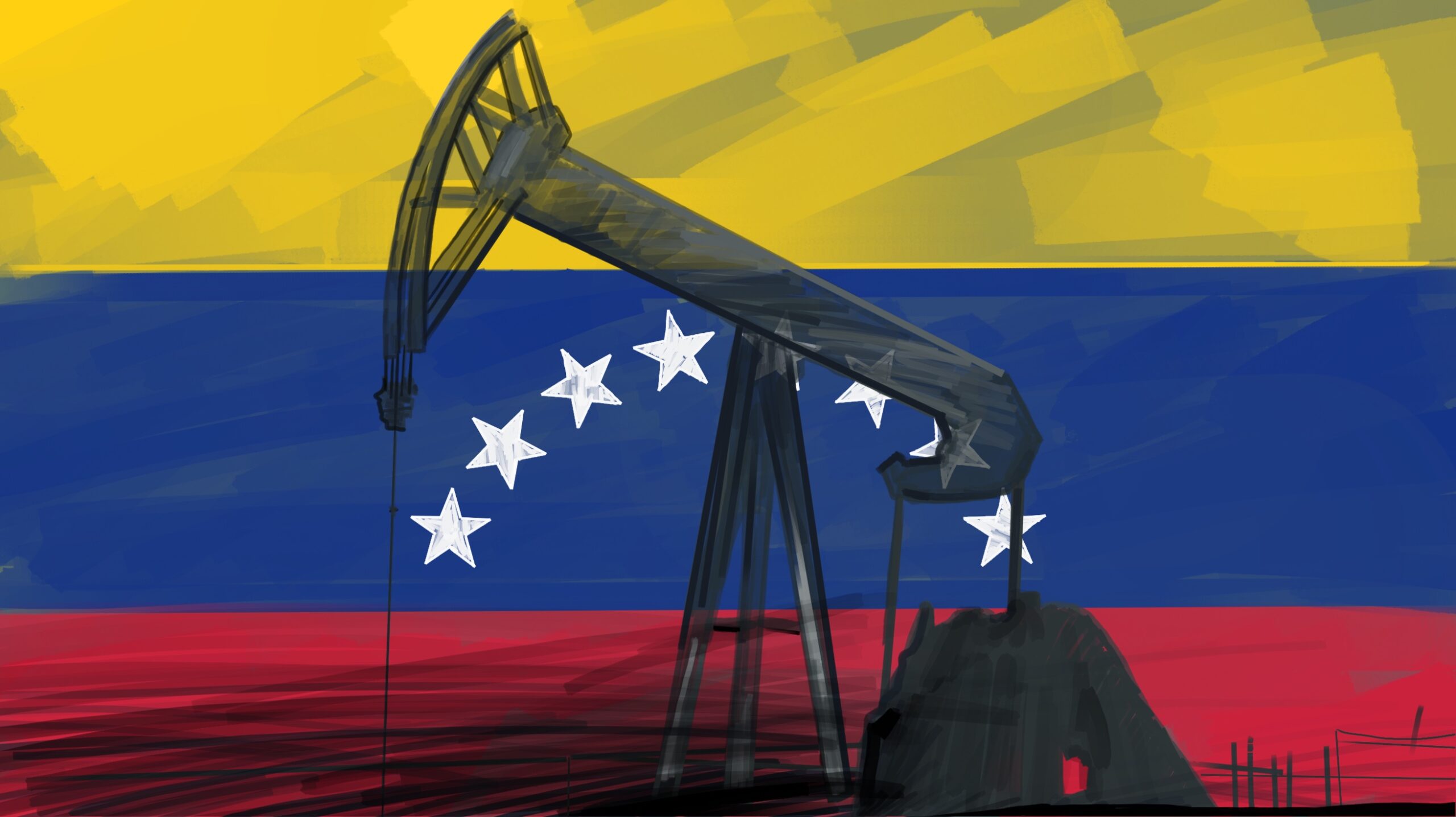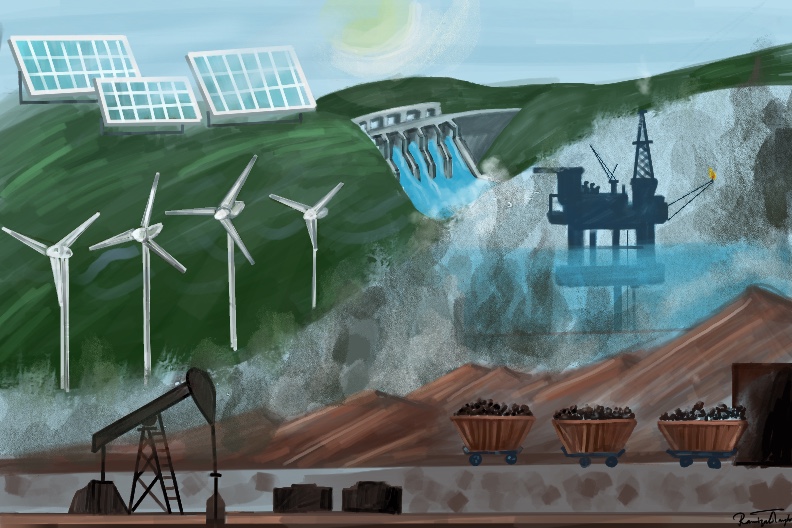Ramizah Tayiba
Promising Beginnings
1922, La Rosa, Maracaibo Basin, Venezuela – Royal Dutch geologists discovered a field gushing an incredible one hundred thousand barrels of oil per day. Venezuela sits atop the largest oil reserve in the world, with more than 300 billion barrels¹ (18% of the global total), primarily in the Orinoco Belt. However, despite its massive potential and booming start in the oil industry, Venezuela is better known today as a textbook example of a failed state.
Poverty, crime, medical shortages, and little to no work opportunities have led to a mass exodus of 7.7 million people in 2014. Nearly 70% of the total population lives in multidimensional poverty. Basic living expenses are so staggeringly high due to hyperinflation that most of the population has to make 170 times the minimum monthly wage to survive.² Without funding and underpaid medical personnel, healthcare institutions have crumbled. Alongside food insecurity and inadequate water access, desperate Venezuelans turn to GoFundMe and other sites to finance basic care.³ School enrollment has been in decline due to a lack of funding, resources, and staff. The presence of criminal gangs and armed groups contributes to high homicide rates, further making the country unlivable. All things considered, Venezuelans are fed up; either leaving by the thousands to neighboring countries or erupting in protests in the streets of Caracas.
But the story wasn’t always like this. Shortly after discovering the La Rosa oil field, Venezuela’s annual oil production shot up from 1 million barrels per day to 137 million, making it the world’s largest oil exporter in 1928 and second in production. More than 100 foreign companies flocked to the country to benefit from Venezuela’s abundant oil wealth.
By the 1930s, three foreign companies controlled 98% of Venezuela’s oil: Gulf, Royal Dutch Shell, and Standard Oil. The Hydrocarbons Law of 1943 was introduced to contain the oil wealth within the country. Foreign companies were now required to hand over half their oil profits. By 1948, government income grew by a factor of six.⁴
The 1950s marked a particularly prosperous period for Venezuela, as it emerged as a key oil supplier to the Allied Forces. Demand continued surging after the war, making the country the fourth wealthiest in the world.⁵ The first democratically elected government arrived in power in 1958, establishing the Central Office of Coordination and Planning (Cordiplan). But amid growth, Venezuela saw the first snapshots of its eventual decline. Due to overproduction, oil prices fell. And so did Venezuela’s revenue. Recognizing the volatile nature of oil rents, Venezuela, alongside other oil-producing states founded the Organization of Petroleum Exporting Countries (OPEC) in 1960 with the goal of better controlling global oil prices. The plan was a success and had a tremendous payoff for Caracas during the 1973 oil embargo when prices quadrupled, resulting in Venezuela achieving the highest per capita income in Latin America.⁶
The Beginning of the End
Despite the many miraculous leaps in economic growth and social welfare since the expansion of the oil industry, several mistakes actively sabotaged long-term prosperity.
Overreliance on Oil
For over a century, Venezuela’s fate was dictated by oil as it accounts for approximately 90% of its foreign exports and nearly 50% of government revenue. Designing an economy around a sole industry is generally understood to be poor planning, as it makes the country more vulnerable to price changes. Venezuela realized this flaw in its system, which led to the creation of OPEC. But by not diversifying their economy, they failed to fully address this vulnerability. Venezuela would experience numerous turbulent price changes which significantly contracted their economy such as the oil glut of the 1980s. One of the most significant consequences of oil dependency occurred between 2012 and 2020, when per capita income fell by 72%, mirroring the sharp decline in oil revenue.⁹
Overspending on Social Programs
Hugo Chávez, Venezuela’s 52nd populist President, was a key figure in this story. In 1999, Chávez initiated the Bolívarian Revolution, which aimed to veer Venezuela to socialism and the ideals of Simón Bolívar. Chávez redirected a substantial portion of oil revenues to poverty reduction, healthcare, and education, leading to major improvements in social welfare. Under Chávez, Venezuela achieved a Gini coefficient of 0.31, the fairest income distribution in all of Latin America. While impoverished regions hailed Chávez for his generous social programs, critics argue that his policies were shortsighted, increasing oil dependency and depleting state funds at an unsustainable rate. Urban voters, in particular, accuse Chávez of pandering to his supporters, using social overspending as a tool for securing re-election.
In addition to overspending, Chávez was overall inept in making long-term decisions and rather acted in personal political interest. Throughout his presidency, he fired competent workers in the oil sector, replacing them with political allies, leading to a decline in production.¹⁰
Failure to Reinvest and Diversify the Economy
The term Dutch Disease originates from the Netherlands in the 1960s when the discovery of natural gas led to a rapidly growing economy but stunted growth in other sectors such as manufacturing and agriculture. Since then, this example served as a cautionary tale of what happens when a country becomes overly dependent on one industry. Given Venezuela’s proven overreliance on oil and natural gas, the term Dutch Disease has been used to concisely explain its current predicament. However, a more nuanced analysis suggests that the way oil revenues were spent had a greater impact than the mere fact of being oil dependent. Norway and Saudi Arabia experienced rapid economic changes since the formation of their respective oil industries but achieved diametrically different outcomes compared to Venezuela. A key decision was re-investing oil revenue into wealth funds and implementing fiscal rules that limited withdrawals to ensure responsible spending. While Former Venezuelan President Hugo Chávez did create FONDEN (National Development Fund), lack of oversight and incompetence led to corruption. Investigations later revealed instead of investing in the country’s future, FONDEN just resulted in a series of half-finished, abandoned projects such as an empty paper factory, aluminum mill, and unused buses.¹¹ Unlike other oil states, Venezuela’s reinvestment efforts were incompetent from the start and failed to offset corruption and mismanagement.
Corruption
To convert oil wealth to long-term economic development, Venezuela needed to reduce government corruption and incompetence. However, it failed to do so under each administration, leading to an ever-growing kleptocracy. In total, it is estimated the country has lost over $100 billion due to corruption.¹² As of 2022, Venezuela ranks 177 out of 180 countries in the Transparency International Corruption Perception Index, making it the 4th most corrupt state in the world.¹³
Decline of Foreign Investment
About 100 foreign companies once rushed to Venezuela during the discovery of the Maracaibo Basin. Foreign investment in Venezuela and the resulting income have grown significantly, with notable peaks at the end of World War I and World War II. Despite its decision to nationalize oil and gas in the 1970s, Venezuela, for the most part, has been favorable to foreign investments. However in more recent years, specifically during the Chávez Era, weak property rights and legal uncertainties have created a more hostile environment for foreign investment in petroleum and other sectors as well. Smurfit WestRock, a Dublin-based paper and packaging company, had its assets in the country seized by the Venezuelan government without adequate compensation in 2018. The World Bank’s arbitration group ruled that Venezuela acted unfairly and violated the terms of the agreement. Numerous legal cases have been filed against Venezuela after its efforts to further nationalize the country’s assets.¹⁴ Arbitrary expropriation discourages foreign businesses, limiting a country’s economic opportunity.
Debt
Venezuela’s estimated debt burden totals over $150 billion.¹⁵ Debt restructuring will be difficult as the country owes money to numerous entities such as individual bondholders, the World Bank, and private businesses. Additionally, both Russia and China have lent significant amounts to Venezuela, expecting repayment through oil shipments. Their involvement may complicate the debt restructuring process, as their respective interests could hinder Venezuela’s recovery.¹⁶
Sanctions
In recent years, U.S. sanctions have dealt a final blow to Venezuela’s chances of economic recovery. Starting in 2005, US sanctions first targeted individuals refusing to cooperate in anti-terrorism efforts. Sanctions were intensified under the Obama and Trump Administrations against sitting President Maduro and his allies, whom the US accuses of human rights abuses and corruption. The US has frozen $5.5 billion of Venezuelan funds in international accounts and threatened all foreign entities who choose to conduct business with the country.¹⁷ Overall, sanctions have led to a 50% drop in public imports in 2020 and have particularly harmed the all-important oil industry, resulting in an estimated $17-31 billion in loss of revenue.¹⁸ Critics say sanctions have only strengthened Maduro’s grip on the country and worsened living conditions for ordinary citizens. Under the Biden administration, calls to ease sanctions have been partially addressed, with some restrictions on Venezuela’s oil sector lifted following an agreement between Maduro and opposition parties. In April 2024, the US reinstated specific sanctions on Venezuela’s oil and gas sector after Maduro refused to honor electoral commitments.¹⁹
Policy Recommendations
Political Approach
As of 2024, Nicolás Maduro, who has been accused of human rights abuses and undermining democracy, leads the country, despite being opposed by the United States and its allies. Venezuela is still a country very much in crisis with inflation rates being one of the highest in the world. Internal policy recommendations must include implementing good governance, the rule of law, and transparency—all of which are likely impossible under Maduro who has repeatedly shown his desire to maintain the status quo. With Maduro in power, the country is at a stalemate. Domestic coups will likely lead to more civil unrest and foreign intervention will lead to greater geopolitical complexities between the West and the Venezuelan allies such as Russia, Cuba, and Turkiye. In addition to leadership, there is also the ongoing humanitarian and security crisis that is only being exacerbated by sanctions. Proposals of using US military assets to establish safe zones have been discussed but physical American presence might escalate to a larger conflict. What can be said definitively is that blanket sanctions on Venezuelan petroleum have failed to oust Maduro and only deepened the humanitarian crisis. Harsher sanctions might also push Venezuela to form more strategic alliances with other hostile powers such as Iran or China. Policy experts suggest precise, targeted sanctions to not worsen the economic toll on ordinary Venezuelans. However, this approach is improbable under the incoming Secretary of State Marco Rubio who advocates for harsher measures against Venezuela and will likely revoke oil licenses granted by the Biden administration.²⁰ Furthermore, as Maduro pushes his luck by reigniting border disputes with Guyana, the US and its allies might finally lose their patience. As Maduro and opposition forces continue their standoff, other work can be done to contain the humanitarian crisis such as supporting relief operations in Brazil and Columbia. For more forceful measures, the US could negotiate cooperation with China and Russia at the UN Security Council, encourage the Lima Group to enforce targeted sanctions, and encourage diplomatic relations between Venezuela and the United States.²¹ If leaders wish to avoid a military conflict, perhaps providing incentives to members of the Maduro government to resign might avoid such a fate.
Economic Approach
Should Maduro decide to prioritize economic reform, the first step should be to enhance judicial independence, moving away from Chávez-era policy. This entails enforcing the provisions of Article 112 of the Venezuelan Constitution, including safeguarding private enterprises from expropriation, confiscation, and obscure property purchases by the government. Furthermore, decisions about nationalizing industries must be made with greater scrutiny as sweeping policies can lead to a decline in production.²² As for debt restructuring, Venezuela must adopt a multipronged approach which starts with engaging in negotiations with creditors aiming to extend repayment periods, reducing interest rates, and seeking debt forgiveness. In addition, the country needs to improve overall fiscal policies and engage in transparent budgeting nationwide to regain confidence among investors, businesses, and the public. Another priority should be stabilizing the Bolívar by allowing supply and demand to dictate its value, rather than relying on strict government controls or pegging it to a more stable currency. Additionally, Venezuela should leverage initiatives like debt-for-nature swaps, where portions of debt are forgiven in exchange for commitments to environmental preservation, such as safeguarding the Amazon. Finally, Venezuela must fix the century-long mistake of being solely oil-dependent, by striving to diversify the economy. The country has significant potential in agriculture, mining, and hydroelectric power, which should be explored to make the overall economy more resilient.
In the end, Venezuela still sits atop the biggest oil reserve in the world. This gift from nature could either be a ticket out of decades of misery or plunge the nation further into chaos. The direction depends on the actions of a handful of politicians and the rancor of the 28 million people residing in the country.
Footnotes
- The lessons to be learned from the oil industry in Venezuela – GIS Reports
- Venezuela – European Commission
- Why Are So Many Venezuelans Going to the United States?
- Venezuela: The Rise and Fall of a Petrostate | Council on Foreign Relations
- How Venezuela Fell Apart – Knowledge at Wharton
- Venezuela: The Rise and Fall of a Petrostate | Council on Foreign Relations
- Venezuela in the 1980s, the 1990s and beyond | ReVista
- Venezuela was once twelve times richer than China. What happened? | World Economic Forum
- How Sanctions Contributed to Venezuela’s Economic Collapse
- Hugo Chávez leaves Venezuela in economic muddle – BBC News
- Hugo Chávez leaves Venezuela in economic muddle – BBC News
- The Role of the Oil Sector in Venezuela’s Environmental Degradation and Economic Rebuilding
- 2022 Corruption Perceptions Index: Explore the… – Transparency.org
- Smurfit awarded $469 mln against Venezuela by arbitration tribunal | Reuters
- Venezuela: The Rise and Fall of a Petrostate | Council on Foreign Relations
- Venezuela: Prospects for Restructuring Sovereign Debt and Rebuilding a National Economy
- Venezuelans hit hard by international sanctions – DW
- New Report Documents How U.S. Sanctions Have Directly Aggravated Venezuela’s Economic Crisis – WOLA
- Biden administration revives oil sanctions on Venezuela, saying Maduro reneged on democracy deal – POLITICO
- Trump pick Rubio could harden oil sanctions on Iran, Venezuela | Reuters
- Stabilizing Venezuela: Scenarios and Options | Council on Foreign Relations
- How Weak Property Rights Contribute to Venezuela’s Crisis



